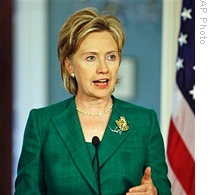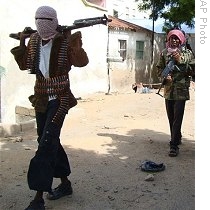Nairobi
31 July 2009
 |
| U.S. Secretary of State Hillary Clinton, 24 Jul 2009 |
Secretary Clinton's first stop will be in Kenya, where she is expected to address the U.S.-Sub-Saharan Africa Trade and Economic Cooperation Forum in Nairobi.
The State Department says the forum will highlight the various issues on the secretary's agenda for the trip, including discussing ways to encourage investment and sustainable economic growth on the continent. In talks with government leaders, the top U.S. diplomat is expected to emphasize, among other things, America's commitment to promoting good regional governance and partnering with regional leaders to prevent conflicts and violence.
A senior Africa researcher for the New York-based Human Right Watch, Tiseke Kasambala, says her group believes Secretary Clinton should also use the opportunity to urge African governments to show a greater commitment to human rights.
"Respect for human rights, the rule of law should be on the table, as well as promoting economic opportunities and growth, during her trip, because we think these are quite important aspects in providing the kind of conditions that are favorable to economic progress," she said.
In Kenya, Human Rights Watch says, people are losing faith that the power-sharing government of President Mwai Kibaki and Prime Minister Raila Odinga will act against powerful politicians and business leaders accused of supporting and inciting ethnic violence in the aftermath of the disputed presidential elections in 2007.
More than 1,300 people were killed and hundreds of thousands of people displaced from their homes during several months of unrest. The rights group says the government's foot-dragging on calls for justice for the victims of post-election violence threatens to undermine Kenya's stability and impede future economic development.
 |
| Somali Islamist militants carry their weapons as they patrol the streets of northern Mogadishu (File) |
The United States has provided about $10 million of military equipment and supplies to the Somali government, and the State Department's top envoy to Somalia says more assistance will be on the way.
Human Rights Watch says the international community, including the United States, has yet to address allegations that troops serving under the previous U.N.-backed government of President Abdullahi Yusuf killed, robbed and raped civilians in 2007 and 2008. Ethiopian forces that intervened to prop up the Somali government were also accused of committing war crimes.
Kasambala says such allegations eroded popular support for the Somali government, while boosting the ranks of insurgents. She says the United States must ensure the same mistakes are not made again.
"And this is why we are asking the United States to ensure that material assistance and training that is given to security forces in Somalia are accompanied by vetting of personnel and the creation of specific mechanisms to respond to serious abuses when they occur," said Kasambala.
Secretary Clinton is also scheduled to make a brief visit to Goma in eastern Congo, where government soldiers in North and South Kivu provinces have been accused of mass looting and raping countless civilians. Human Rights Watch says the secretary should urge the government in Kinshasa to prosecute all military personnel, regardless of rank, who have committed serious human rights abuses.